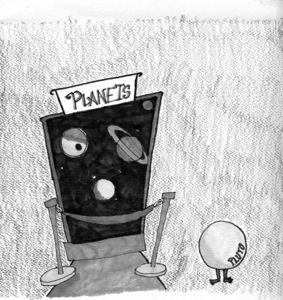After three years, space politicization continues
Rare is a thing so unknowable as to provide infinite wonder. In a simpler age, the night sky might have been such a thing. It sure isn’t now.
Last Monday marked the three-year anniversary of one of the saddest days in recent memory: Pluto’s demotion to dwarf-planet status. Years of watching Ms. Frizzle and her magic school bus navigate the nine planets of the solar system with her intrepid students — wasted.
Much has been written on that fateful vote by the International Astronomical Union to divest Pluto of its planetary rights — some supportive, some critical — but little can be gained by rehashing old arguments. What’s done, as Lady Macbeth said of another fateful, equally disturbing event, is done. Nothing we Plutophiles say or do now will give us back what we have irrevocably lost.
We should be less concerned about the fate of Pluto now and more concerned about the fate of the cosmos, which faces another kind of demotion.
Pluto, it should be noted by way of explanation, was demoted by vote, a severe blow to claims of science’s so-called rigor. What’s worse, the vote was based on a poorly assembled, very new definition of “planet,” one which some experts — including the director of the Planetary Science Institute, according to CNN — say will be invalidated in a few years. Finally, when members of the IAU convened in August 2006 to cast their ballots, only 4 percent actually showed up. Not only was the process decidedly unscientific, it was decidedly informal.
We can’t help but think of political institutions like the Senate while reading of the IAU’s “scientific” voting procedures, which should clue us in to a tragic eventuality: the slow but steady politicization of space. Important matters of science have been reduced, or demoted, to unimportant matters of politics.
Before all this — well before the politics, before we even knew of the solar system and of the existence of other planets — space was, like a cookie jar to a small child, maddeningly unreachable — and probably a lot more wonderful because of it. Our distant ancestors could look up at the night sky and simply gape at its unknowable vastness, perfectly content in their blissful ignorance.
Contemplating the unknowable enriches and expands the mind. If we already have the answers, we rarely engage the questions. We need to wonder. We need to not know.
Now, instead of seeing what might be fireflies caught in that big bluish-black thing, or a holey blanket draped across the sky by some god of sleep, we see stars and planets, named and codified by an impersonal political authority. The politicization of space becomes the demystification of space: lowly earthbound scientists systematically squashing the wonder out of one of the world’s richest gifts. This is the ultimate cosmic demotion.
One might say this hopelessly quixotic argument discourages progress by aiming to restrict man’s inborn propensity to make sense of the world. Not so.
A continuous pursuit of knowledge is only meaningful if we do it carefully, never forgetting to keep asking questions. More specifically, we should not politicize the process of ruling on the planetary statuses of heavenly bodies, making the mystical seem as banal as getting pork-barrel spending legislation passed through 4 percent of the Senate.
I don’t want to look up at the night sky and think about the IAU bickering over Pluto’s status as a planet. I want to see an expanse of profound nothingness, something I never want to fully understand, but nonetheless glory in trying to. I want one of the last vestiges of genuine wonder on this planet to be preserved, to be unpolluted by man’s compulsive quest to know everything. Sometimes, ignorance truly can be bliss.
Jason Kehe is a sophomore majoring in print journalism. His column, “Small Wonder,” runs on every other Wednesday.

